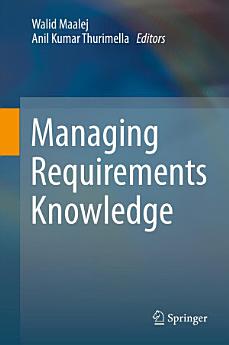Managing Requirements Knowledge
Walid Maalej · Anil Kumar Thurimella
มิ.ย. 2013 · Springer Science & Business Media
eBook
398
หน้า
reportคะแนนและรีวิวไม่ได้รับการตรวจสอบยืนยัน ดูข้อมูลเพิ่มเติม
เกี่ยวกับ eBook เล่มนี้
Requirements engineering is one of the most complex and at the same time most crucial aspects of software engineering. It typically involves different stakeholders with different backgrounds. Constant changes in both the problem and the solution domain make the work of the stakeholders extremely dynamic. New problems are discovered, additional information is needed, alternative solutions are proposed, several options are evaluated, and new hands-on experience is gained on a daily basis. The knowledge needed to define and implement requirements is immense, often interdisciplinary and constantly expanding. It typically includes engineering, management and collaboration information, as well as psychological aspects and best practices.
This book discusses systematic means for managing requirements knowledge and its owners as valuable assets. It focuses on potentials and benefits of “lightweight,” modern knowledge technologies such as semantic Wikis, machine learning, and recommender systems applied to requirements engineering. The 17 chapters are authored by some of the most renowned researchers in the field, distilling the discussions held over the last five years at the MARK workshop series. They present novel ideas, emerging methodologies, frameworks, tools and key industrial experience in capturing, representing, sharing, and reusing knowledge in requirements engineering.
While the book primarily addresses researchers and graduate students, practitioners will also benefit from the reports and approaches presented in this comprehensive work.
This book discusses systematic means for managing requirements knowledge and its owners as valuable assets. It focuses on potentials and benefits of “lightweight,” modern knowledge technologies such as semantic Wikis, machine learning, and recommender systems applied to requirements engineering. The 17 chapters are authored by some of the most renowned researchers in the field, distilling the discussions held over the last five years at the MARK workshop series. They present novel ideas, emerging methodologies, frameworks, tools and key industrial experience in capturing, representing, sharing, and reusing knowledge in requirements engineering.
While the book primarily addresses researchers and graduate students, practitioners will also benefit from the reports and approaches presented in this comprehensive work.
เกี่ยวกับผู้แต่ง
Walid Maalej recently became a professor of informatics at the University of Hamburg. Prior to that, he had led a research group on context and human aspects in software engineering at the TU Munich, where he also received his Master and Doctorate degrees. For the Managing Requirements Knowledge book, Walid brings in a unique multidisciplinary and internationally renowned research profile covering the fields of Knowledge Management, Empirical Software Engineering, and Requirements Engineering.
Anil Kumar Thurimella is currently leading Requirements Engineering and Management for the BMW Programs at Harman Automotive Division in Munich. He is also an external Senior Researcher at the TU Munich, where he completed his Master’s degree and doctorate in Computer Science. For the Managing Requirements Knowledge book, Anil has contributed a unique blend of industrial and academic experience on Requirements Engineering.ให้คะแนน eBook นี้
แสดงความเห็นของคุณให้เรารับรู้
ข้อมูลในการอ่าน
สมาร์ทโฟนและแท็บเล็ต
ติดตั้งแอป Google Play Books สำหรับ Android และ iPad/iPhone แอปจะซิงค์โดยอัตโนมัติกับบัญชีของคุณ และช่วยให้คุณอ่านแบบออนไลน์หรือออฟไลน์ได้ทุกที่
แล็ปท็อปและคอมพิวเตอร์
คุณฟังหนังสือเสียงที่ซื้อจาก Google Play โดยใช้เว็บเบราว์เซอร์ในคอมพิวเตอร์ได้
eReader และอุปกรณ์อื่นๆ
หากต้องการอ่านบนอุปกรณ์ e-ink เช่น Kobo eReader คุณจะต้องดาวน์โหลดและโอนไฟล์ไปยังอุปกรณ์ของคุณ โปรดทำตามวิธีการอย่างละเอียดในศูนย์ช่วยเหลือเพื่อโอนไฟล์ไปยัง eReader ที่รองรับ




